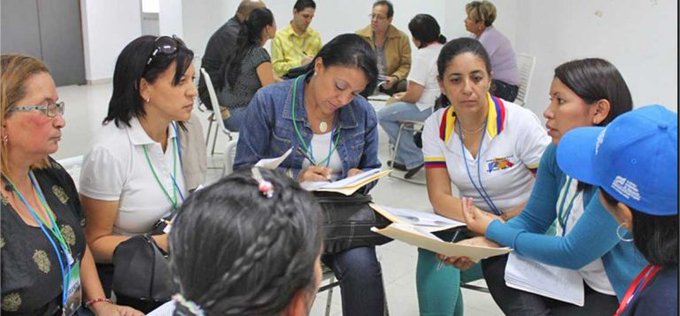Se trata de la nepalí Sabina Shresta, la nicaragüense Brisa Isela Bucardo, la india Shatabdi y la colombiana Yadis Xiomara
Europa/MADRID, España/ Agencia Reforma
Siguiendo el ejemplo de la joven pakistaní y Premio Nobel de la Paz Malala Yousafzai, cuatro niñas en Colombia, Nepal, Nicaragua e India luchan por empoderar a las mujeres en su país.
Se trata de la nepalí Sabina Shresta, la nicaragüense Brisa Isela Bucardo, la india Shatabdi y la colombia Yadis Xiomara. Las cuatro trabajan con la ONG Plan International.
A los 17 años, Sabina Shresta ha conseguido evitar el matrimonio de por lo menos seis niñas con hombres mayores en su país.
Brisa Isela Bucardo, de 16 años, es consejera comunitaria y tiene un programa de radio, Zona 90, en el que habla sobre derechos de las mujeres, violencia doméstica y salud sexual.
Shatabdi tiene 15 años y colabora con la Policía de Nueva Delhi en un programa de seguridad urbana. Ha logrado reducir casi en un 90 por ciento los casos de acoso que ocurrían en su comunidad.
Yadis Xiomara, de 15 años, preside la Plataforma Juvenil de su municipio, donde aboga por el derecho a la educación de las niñas.
«Ser niña es ser invisible», lamenta Brisa en charla con El País. En la zona indígena donde vive, le han enseñado que su papel es hacer los quehaceres del hogar, servir al hombre y ser una buena madre de familia.
Las niñas de entre 5y 14 años dedican más tiempo que los niños de su misma edad a tareas del hogar y a ir a buscar agua y leña, un total de 160 millones de horas más, según un informe de Unicef.
Pero Brisa sabe que puede hacer más que eso.
«Quiero ser periodista. Así podré llevar a otras mujeres mensajes sobre qué hacer en una situación de violencia, por ejemplo», cuenta.
En el caso de Yadis, quien vive en una comunidad rural, en la montaña, a 553 kilómetros de Bogotá, el principal problema es la dificultad que tienen para llegar a las aulas: los colegios están lejos de las poblaciones y, debido al conflicto de décadas entre el Gobierno colombiano y las FARC, hay minas en el camino.
A lo largo de los años, algunos menores han muerto debido a las explosiones.
«La educación es precaria, por eso carecemos de espacios de participación que incluyan a las niñas», cuenta la joven.
Para mitigar la situación, Yadis montó un grupo en su escuela para dar charlas sobre los derechos de las mujeres.
Ella habla, entre otras cosas, sobre la prevención de embarazos en la adolescencia y de enfermedades sexuales e incentiva a otras jóvenes a que tengan un «proyecto de vida».
El sueño de esta quinceañera es estudiar Derecho Político para convertirse en Ministra de Educación en Colombia.
«El desarrollo de un país depende de la educación, y las niñas somos una pieza clave en ese proceso», afirma Yadis.
Sabina también lucha para que las cosas cambien en Nepal, que está entre los 10 países con mayores tasas de matrimonio infantil, según Unicef.
Un estudio de 2013 realizado por la organización Plan Asia y el Centro Internacional para la Investigación sobre la Mujer indica que el 41 por ciento de las mujeres nepalesas entre los 20 y 24 años contrajeron matrimonio antes de la edad legal de 18 años.
«Ser niña en Nepal es como llevar una cruz. Nos perciben simplemente como empleadas domésticas», explica.
Para poner fin a esa vía crucis, Sabina participa en talleres de promoción de los derechos infantiles, a través de los cuales ha podido frenar matrimonios forzados, ofreciendo protección a las víctimas de esa práctica.
Su pasión es el trabajo social y por eso quiere ser consejera del Gobierno en políticas sociales.
El matrimonio infantil también es un problema en India.
En la comunidad de Shatabdi, una colonia de reasentamientos, la mayoría de las chicas abandona la escuela después de ser obligadas a casarse cuando son adolescentes.
Allí lo que se espera de una niña es que se eduque y se embellezca para llegar a ser una buena esposa, siguiendo unos cánones muy estrictos, como no exponerse al sol para tener la piel clara, no levantar nunca la voz ni reírse muy fuerte y hablar siempre de forma suave.
«Yo siempre quería jugar en la calle, pero me lo prohibían. Nunca he entendido porque una niña tiene que estar siempre en casa, renunciar a ir a la universidad y casarse tan pronto», cuenta la joven, con una seguridad inesperada para su edad.
Para hacer su comunidad más abierta y más segura, ella colabora con un programa de seguridad urbana y clases de defensa personal para mujeres. Su grupo organizó reuniones para que hubiera mayor presencia policial en las calles y así reducir los casos de acoso sexual.
«Pedí a las autoridades que nos ayuden a cumplir nuestros derechos», dice Shatabdi. Ella nació el 1 de enero de 2001, el primer día del siglo 21. Su nombre significa «secular».
Remite al principio de un cambio hacia una sociedad más igualitaria.(Agencia Reforma)
Fuente: http://www.elmanana.com.mx/noticia/116077/Luchan-nias-por-empoderamiento-en-sus-paises.html
Imagen tomada de: http://www.elmundodetehuacan.com/~elmundod/index.php/pais/pais-conten-otras/13305-Luchan-ni%C3%B1as-por-empoderamiento












 Users Today : 99
Users Today : 99 Total Users : 35416334
Total Users : 35416334 Views Today : 118
Views Today : 118 Total views : 3349669
Total views : 3349669